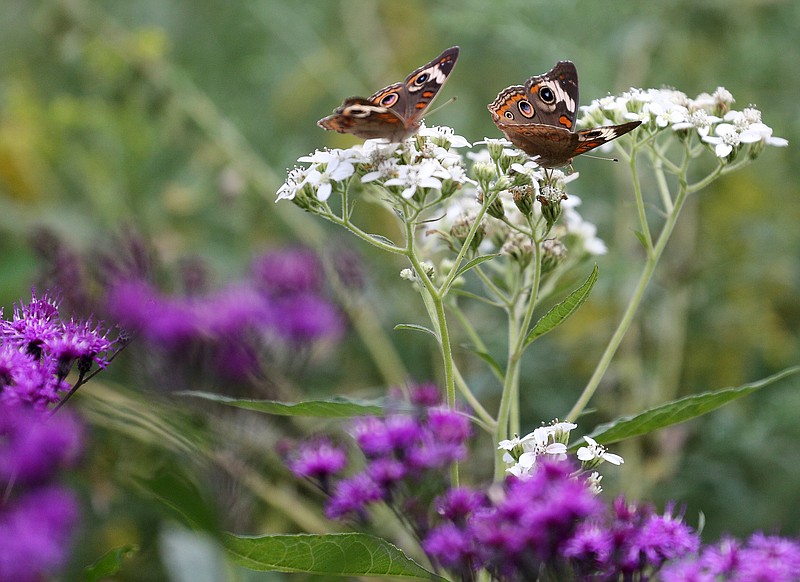Scientists around the world are reporting a decline in flying insects.
No, not mosquitoes, unfortunately.
We're talking about a decline of the good-guy bugs, the ones we like and need - like native bees, butterflies, fireflies, moths, ladybugs and mayflies.
This is a problem - and not just one of fancy or beauty: These guys help feed us. Literally.
They pollinate plants, make up a key link in the overall food chain and help decompose life.
"You have total ecosystem collapse if you lose your insects. How much worse can it get than that?" said University of Delaware entomologist Doug Tallamy. If these insects disappeared, "the world would start to rot."
Tallamy was in Chattanooga earlier this month as a guest of the Tennessee Valley Wild Ones to speak about "Creating Living Landscapes," and he was interviewed by WUTC's "Here and Now" program. You can listen to that 15-minute interview at www.wutc.org. He also was quoted in an Associated Press story published Friday on the front page of the Chattanooga Times Free Press.
Tallamy says there are a variety of suspected reasons for the good bug declines, but they all lead back to what we humans are doing to the environment - particularly the environment of our yards.
Often unintentionally, we exacerbate habitat loss with our custom of creating a wall-to-wall lawn. We use insecticides and herbicides, hoping to control pesky things like mosquitoes and dandelions, without fully understanding that the chemicals are non-discriminatory, also eliminating bees and moths, along with native, wild butterfly weed and coneflowers. We plant trendy non-native plants that our birds and insects can't eat. We insist on street lights that disrupt natural bug rhythms. Highway traffic and climate change don't help, either. Nor do invasive plants like kudzu, which cover and smother the native plants that support native insects, birds and other wildlife.
Native plants, even those we've been misled to think of as weeds, are what bugs eat and where they live, Tallamy says. Milkweeds, crucial to the beautiful monarch butterfly, are dwindling fast, no thanks to farming herbicides. And manicured lawns in the United States are so prevalent that, added together, would be as large as New England.
Those landscapes are "essentially dead zones," he says. And not just for pollinators.
Take Carolina chickadees, for example. The tiny little tuxedoed birds require 6,000 to 9,000 caterpillars to raise one clutch of chicks. When we build landscapes with lawn carpets or let kudzu run, those "dead zones" aren't attracting insects that make caterpillars. Then the chickadees can't reproduce. Because everything is connected, if insects and birds can't reproduce, neither can lots of other things.
In the WUTC interview, Tallamy offered a startling canary-in-a-coal mine example: The 2016 State of the Birds Report states that "432 species of North American birds are at risk of extinction because their populations are declining so rapidly. That's more than a third of the bird species of North America. That's a wake-up call."
As we keep removing species from our ecosystems by messing with habitats and food webs, we're destroying the ability of those ecosystems to support us, he says.
"A lot of people say we're in the sixth great extinction on planet earth, but this one's being caused by us, not an asteroid or something," Tallamy says. "And the time to be talking about this is when things are declining, not when they're gone."
Wild Ones is a national organization that promotes native plants and sustainable landscaping. Think of it as an eco-based garden service club with a natural mission. Its motto is "healing the earth, one yard at a time."
The Tennessee Valley Chapter of Wild Ones (full disclosure: this writer is a member) recently awarded its 2018 Habitat Hero Awards to honor individuals or organizations that have made significant contributions to the cause of native plant and habitat conservation.
It shouldn't surprise anyone in Chattanooga that the Tennessee Aquarium Conservation Institute and W.M. Whitaker & Associates jointly received one of those awards for developing TNACI's front yard and riverbank meadow at 175 Baylor School Road. If you think you can't make a beautiful garden with native wildflowers, drive by this one and readjust your attitude.
This particular meadow also restores impaired wetlands and riparian forest strips, establishes bioretention rain gardens and uses a green infrastructure design to improve water quality. The institute also uses it as a living classroom, where visitors learn about the importance of habitat protection and cleansing rainwater.
The local Wild Ones gave a second award to Overhill Gardens, in Vonore, Tennessee, for providing a 20-year, year-round retail source of locally raised native grasses, forbs, shrubs, and trees to homeowners and businesses converting their landscapes from Asian and European plants to native species.
Healing the earth, one yard, one plant, one bird - and one bug - at a time.
